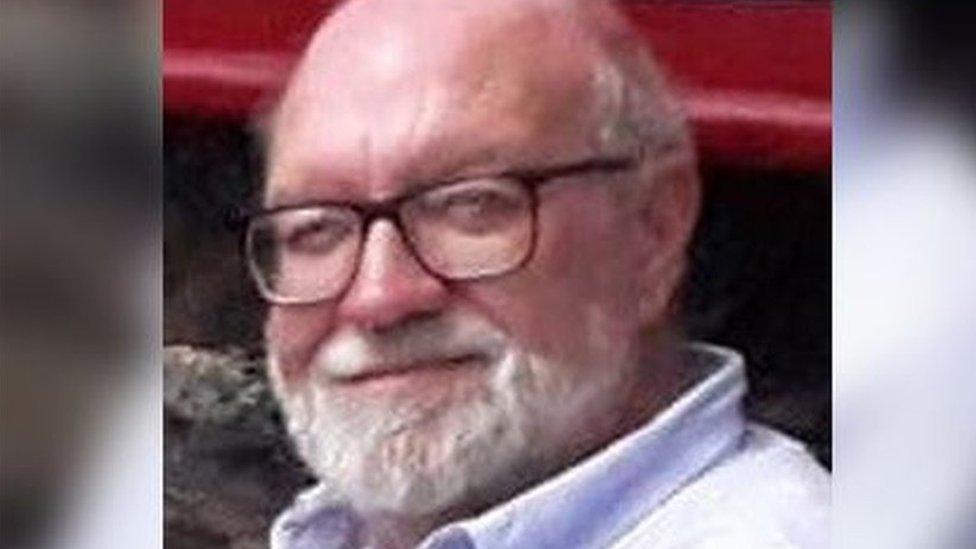Anglesey crossbow murder: How car technology helped catch a killer
- Published
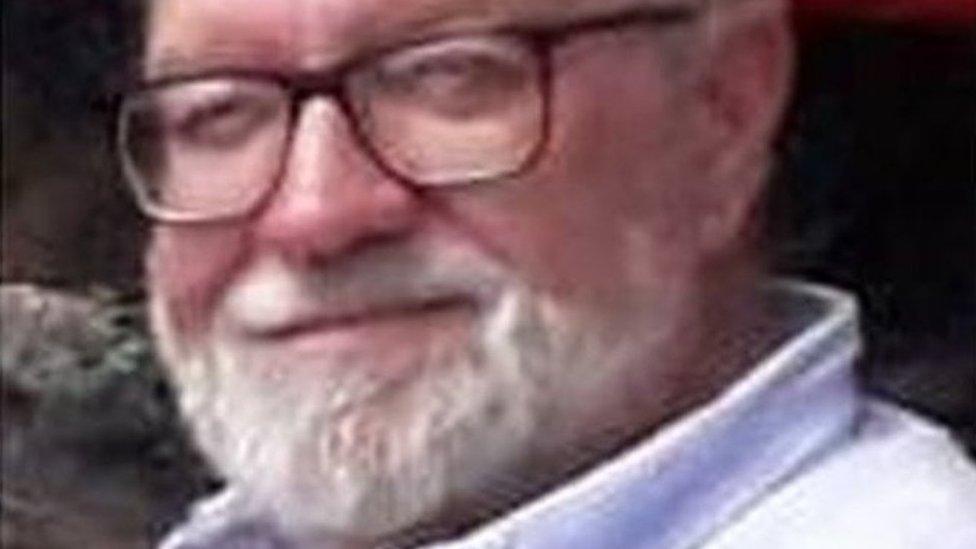
Gerald Corrigan thought he had suffered an electric shock
It was a murder that shocked the country and led to a direct appeal from the prime minister.
It started in a house called Gof Du - Gerald Corrigan's home in Porthdafarch on Anglesey. He lived there with his partner Marie Bailey. It's a place so remote, it was said, you'd need a reason to visit there. And on Good Friday last year, the reason was murder.
A jury heard the couple were "creatures of habit," and while Marie usually retired early to bed, rising early, Gerald was a night owl, regularly staying up until the early hours on his computer or watching TV.
Gerald had been a photography and video lecturer at Blackpool College of Art in Lancashire before retiring to the coastal spot about 20 years ago. He loved nature, wildlife and fishing and was in the perfect place, close to a beach and one of the island's nature reserves. Marie called him her "best friend and soul mate".
His daughter Fiona said he was "an average bloke" enjoying his retirement. "He enjoyed a lie in, a nice cup of tea and reading books. He loved Laurel and Hardy films and photographing flowers and mountains," she said.
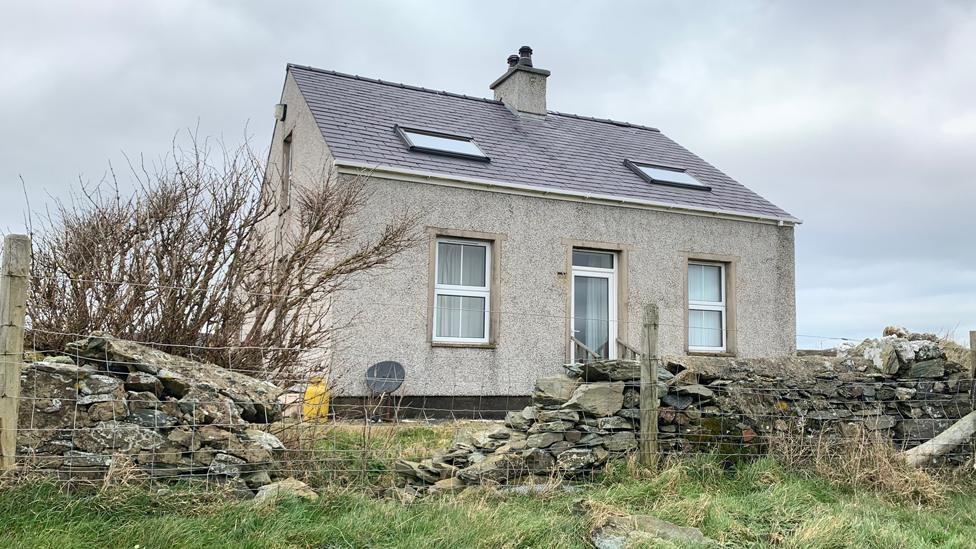
Gerald Corrigan's home - and the gap in the wall which gave the killer a clear sight to shoot him
He had been watching TV on the evening of 18 April 2019. But shortly after midnight on 19 April, his signal was lost.
Thinking there was a technical problem, he went outside to adjust his ground-level satellite dish, but little did he know it had been tampered with, and a killer was waiting in the darkness.
As he bent over the dish, a crossbow bolt slammed into his body, passing straight through his abdomen, then through his arm, before ricocheting off the wall of the house.
Gerald had no idea what had happened. He thought he had suffered an electric shock.
He was bleeding heavily and, with massive internal damage, somehow found the energy to make it back inside, waking his partner, who raised the alarm.
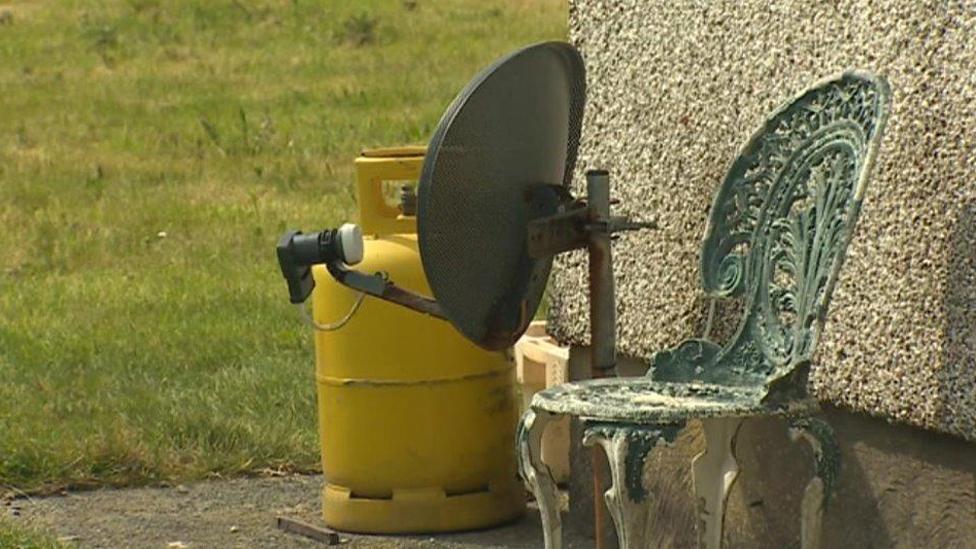
The disabled satellite dish at the property
"How he got himself up the stairs, I don't know," Marie told the court.
She rang emergency services twice as her husband was "crying... he was shouting he was in pain".
When paramedics arrived, he told them he'd been electrocuted. But this did not tally with his injuries, and - curious to see what really happened - one of the 999 responders went to view the scene.
He found a crossbow bolt, which he took with him to the hospital with Mr Corrigan.
The broadhead bolt used was the type used to hunt animals. The trial heard whoever loaded that crossbow knew precisely what it was going to do: "To kill Mr Corrigan in the most brutal way."
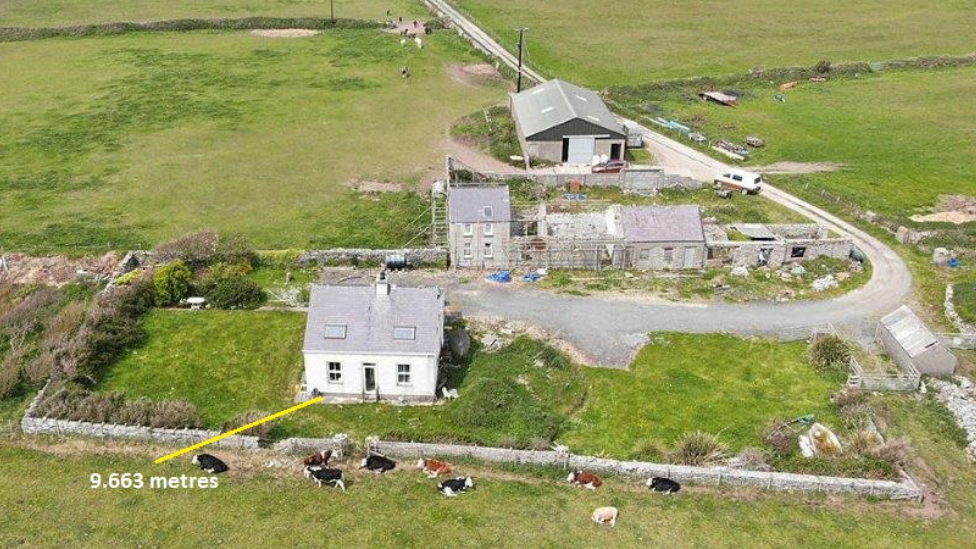
This image of Gerald Corrigan's house shows where North Wales Police believe the shooter was positioned
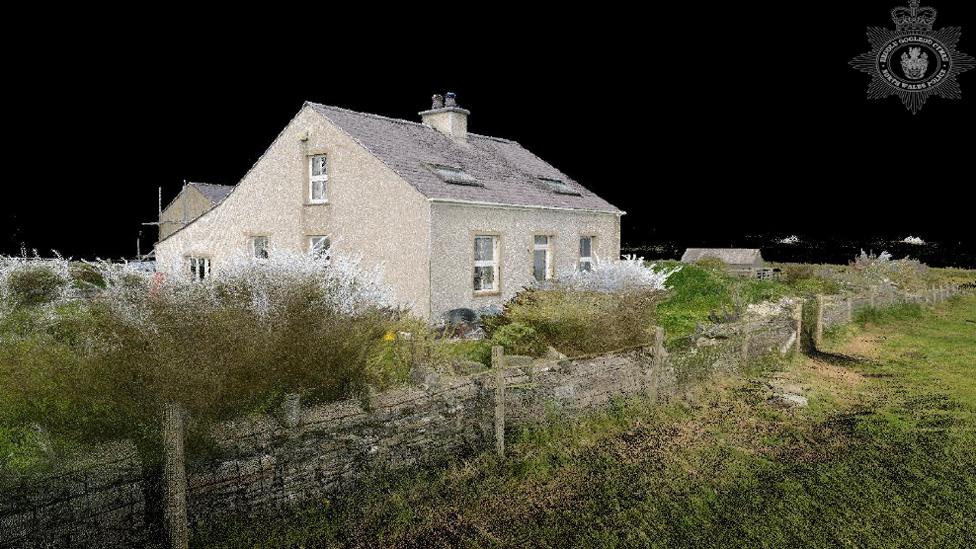
A police 3D image from the position of the shooter
Analysis of Mr Corrigan's injuries would help calculate the angle of shot and the location of the shooter.
It pinpointed a spot behind a garden wall where the murderer lined up about 10m from his prey and pulled the trigger with deadly accuracy.
Where did the crossbow come from?
Following Mr Corrigan's death, then-Prime Minister Theresa May urged anyone with information to come forward.
In fact, someone had already approached police.
Within days of the the shooting, the director of Outdoorhobbies - the largest UK supplier of crossbows - contacted North Wales Police offering to help.
The company was asked to supply details of anyone on Anglesey who had bought a crossbow from them in the previous 10 years.
A list of 17 people was compiled, but 15 bought their crossbows before 2015 and were not of immediate interest.
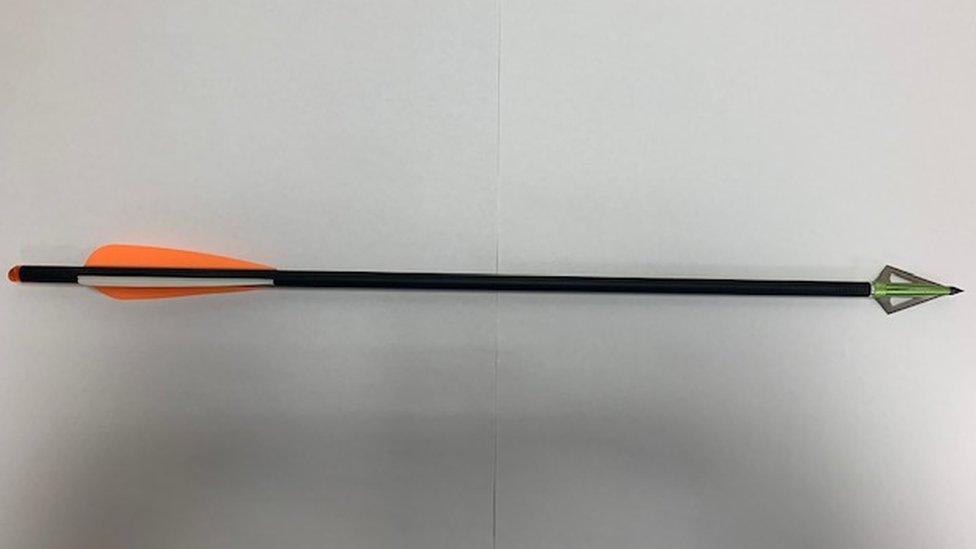
This crossbow bolt, bought online by detectives, was 18in (45cm) long
The last person on the list bought an Excalibur 355 on 11 April 2019 - described on the company's website as "the perfect crossbow for situations where space is tight but power is necessary".
That person was sports therapist Terry Whall.
The £750 crossbow was not delivered to Whall until after Mr Corrigan was shot, so could not have been the murder weapon.
However, when police went to see him, Whall told them he had owned another crossbow, but sold it months earlier to a stranger who saw him outside his property with it.
Whall said it was a "big, heavy and clumsy item," which was also "far too heavy for the kids to use," and he agreed to sell it for £180. That crossbow was never found.
Whall's association with crossbows, said the prosecution, was the first piece of the jigsaw.
A further piece came when officers discovered that in early April 2019 - after he claimed to have sold the first crossbow and before he ordered the Excalibur model - he ordered bolts which were the same as the one used to kill Mr Corrigan.
He had also ordered broadhead tips, which again matched the one used in the killing.
When police eventually searched his home, there was no sign of either the bolts or the broadheads.
They would later find a punchbag at his home, full of puncture holes - many of which matched the diameter of the bolt used to kill Mr Corrigan.
There was still work to do, but police had Whall firmly in their sights.
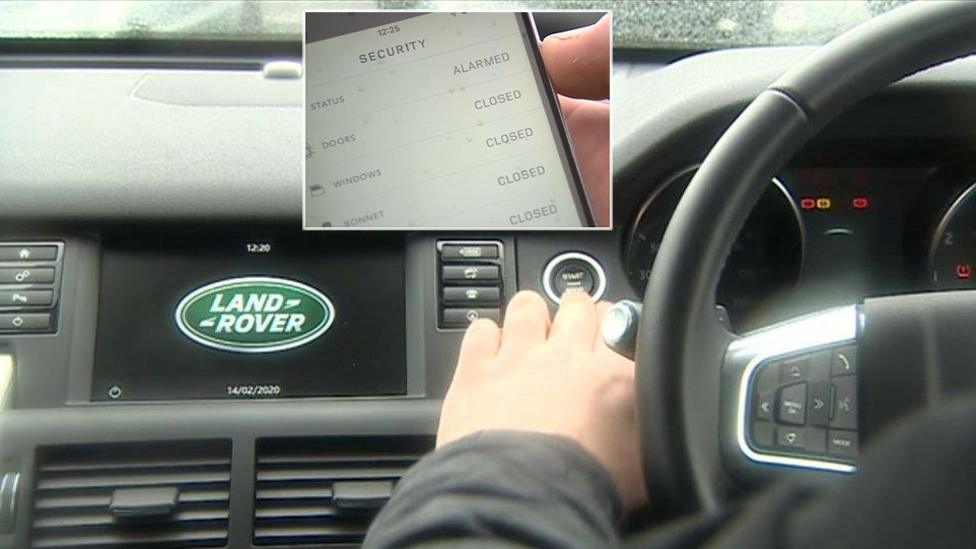
Land Rovers come with sophisticated in-car and (inset) remote telematics to help the owner - but its 'black box' also sends data to the company
How technology caught a killer
Whall was described in court as someone who loved the outdoors, preferring his children to be outside rather than playing video games.
Ironically, modern technology would ultimately lead to his downfall.
His partner, Emma Roberts, was away at the time of the murder, meaning he had sole access to her Land Rover Discovery.
Some modern, expensive cars are installed with electronic systems which can track and store information about its movements. This so-called telematics system can be used as a tracking device if the car is stolen. It can also tell when a car's engine is started or stopped and even when a window, door or boot is opened and closed.
Like a mobile phone on wheels, the system uses a SIM card.
Nick Harvey, risk data manager for Plant-I telematics company, said data is live constantly and GPS tracking could be accurate within 5m.
He said over the past 10 years, such tracking had become more commonplace in car technology and security systems and could now help with investigations.
"Wherever a vehicle is going, it is sending into a cloud - no matter what happens to that vehicle there is always data behind," he said.
"We have personally been looking at crash investigations, insurance and human trafficking cases, cars going abroad and coming back and the police have gone to the company to see where a vehicle has been and gone."
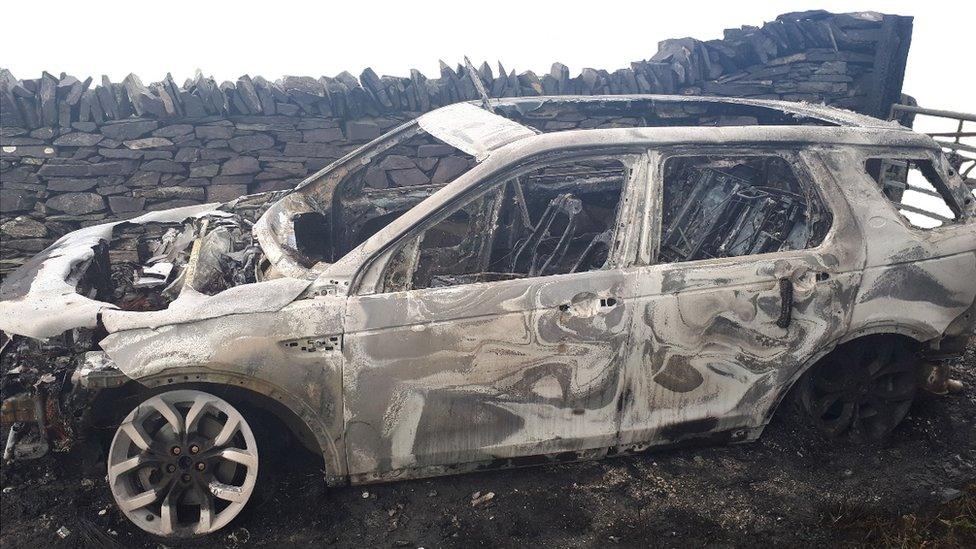
This Land Rover, belonging to Whall's partner, was found burned out - but data from its pre-installed systems survived
On 3 June, two weeks after Whall was first interviewed by police, the car was found burned in Llanllechid, near Bangor. Two other men have already admitted arson and await sentence in relation to this.
After tracing the Land Rover back to Whall and his partner, police decided to probe further into the arson, to see if it was connected to Mr Corrigan's shooting.
Whall may have believed he had covered his tracks by having the Land Rover destroyed, possibly believing any telematics data would also go up in smoke, but his every move had been recorded and stored, back at Jaguar Land Rover.
When police obtained the data, it provided another, key piece of the puzzle.
It revealed Whall had parked at Porth Dafarch beach - a short walk from Mr Corrigan's home - at 23:10 on 18 April.
The boot was opened at 23:11:04 and closed 39 seconds later. This was Whall, said prosecutors, removing the crossbow.
Mr Corrigan was shot at either 00:29 or 00:30 on 19 April.
Again, modern technology - this time from Sky's records - proved a satellite signal was present at his home at 00:08. Its records show that at 00:28, the viewer (Mr Corrigan) stopped a pre-recorded programme and the satellite signal was "no longer present".
Roughly 12 minutes later, the Land Rover's boot was opened back at the beach. It closed 14 seconds later, at 00:42:49.
Whall was making his escape.
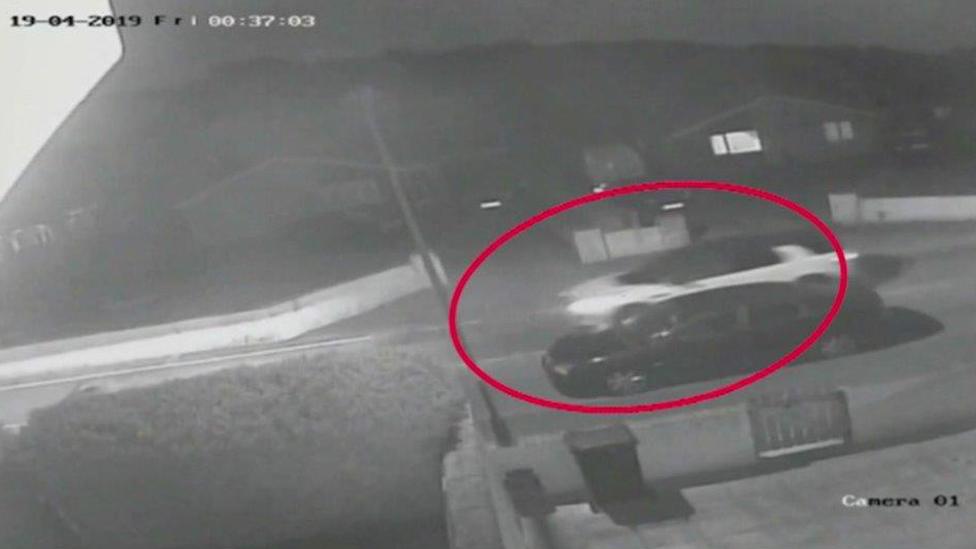
CCTV footage of a Land Rover travelling along Porthdafarch Road
CCTV picked up the car at several locations as he made his way back home, about eight miles (13km) away.
Telematics show he arrived at his house at 00:57 when a car door was opened and closed twice within seconds.
The boot was opened at 00:57:39 and remained open for up to five minutes, closing at 01:02:03. This, said the prosecution, was Whall removing the crossbow and putting it somewhere else.
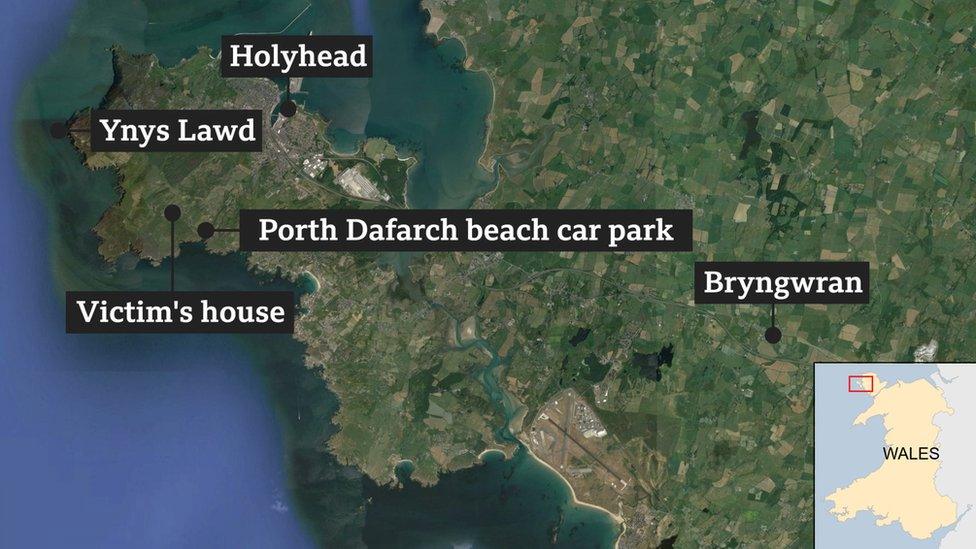
How was the killing planned?
Police knew whoever pulled the trigger would have had to plan the attack.
The night before the shooting, telematics placed the Land Rover Discovery at Whall's home at Bryngwran at 21:18. The engine was switched on at 21:20 and 22 minutes later it was switched off - on the driveway to Mr Corrigan's remote home.
At 22:04 a single car door was opened and closed. After two lights came on in the house, the car left.
It drove to Porth Dafarch Beach, arriving at 22:11, and the engine was switched off.
The engine remained off for about 90 minutes and was started again at 23:52.
It arrived back at Whall's address, where the engine was turned off at 00:09.
Whall had been scoping the area and preparing his kill. He claimed he had to "get out of the house, to get fresh air" and to meditate.
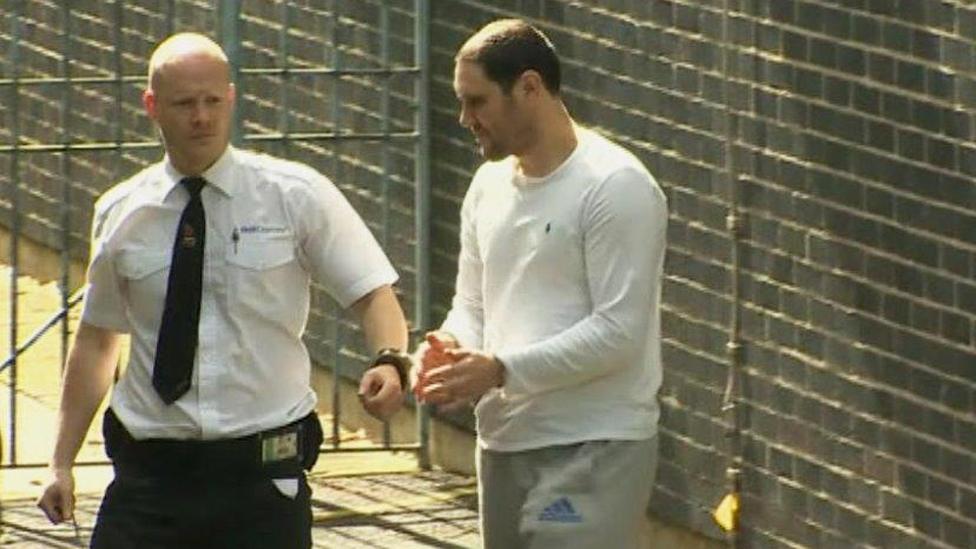
Terry Whall leaving court
Who is Terry Whall?
Originally from east London, he moved to Anglesey a year after his first marriage broke down in 2009. He remarried but that relationship broke down in 2015.
Whall worked for gyms in Bangor, where he built up a client base and then set himself up as a sports therapist, tai chi instructor and personal trainer in the area, moving to a larger premises in Treborth.
He claimed he was "different to other trainers - more advanced" and his fees rose to £60 an hour.
Whall met Emma Roberts early in 2018 and had been living with her and her children at a house in Bryngwran on Anglesey from that August.
A son from his first marriage moved to live back with his mother in Essex two months later.
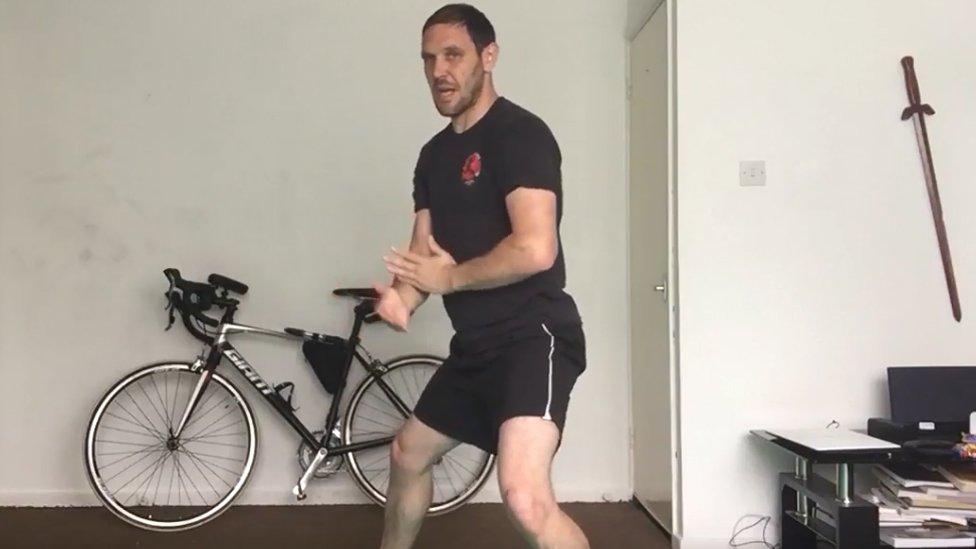
Terry Whall in one of his fitness videos on YouTube
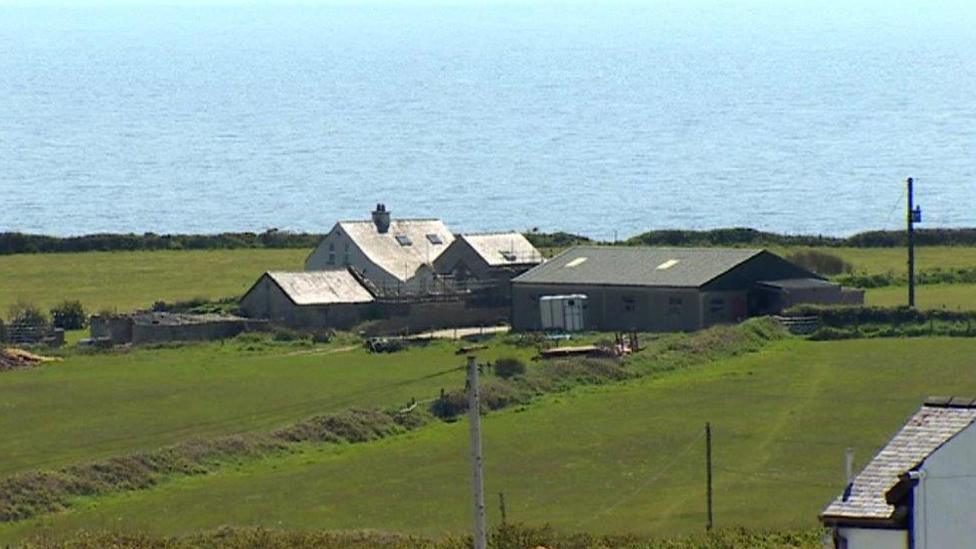
The view of the coast near Gerald Corrigan's home
The alibi
Whall told police he had never met Gerald Corrigan and said he was having sex with a man - called Barry Williams or Bazza - in a field at the time of the murder.
He claimed he got to know Mr Williams, who had been a client with a back problem, and they "just got closer".
Whall said he didn't tell police initially about their involvement because "no-one had the right to know" but his alibi collapsed when Mr Williams denied ever having a relationship with him.
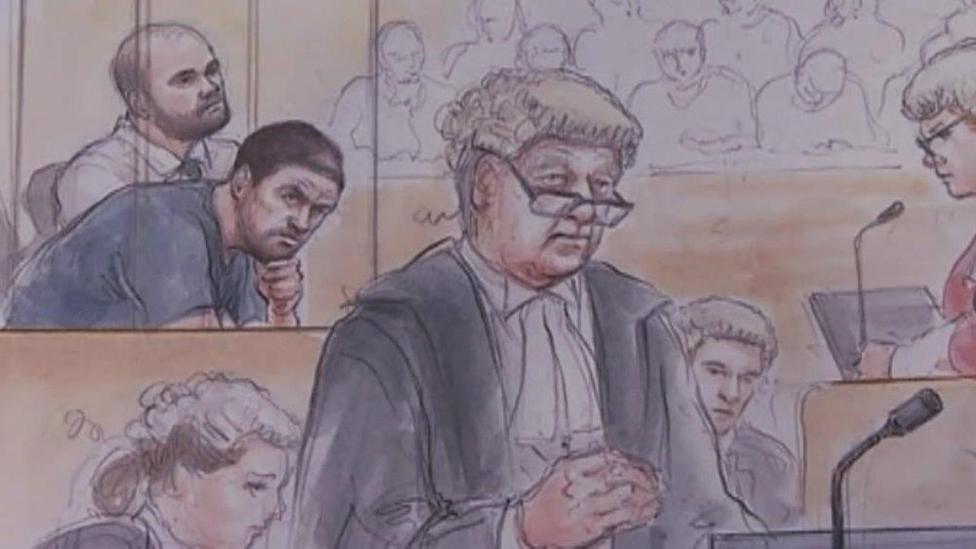
The trial was told we may never know why Mr Corrigan was murdered
The jigsaw of evidence
The complexity of the case saw it generate 5,500 documents and involve a team of 50 police officers before going to a trial lasting five weeks.
"If it wasn't for the electronics, the black box in the Land Rover - which didn't just record information but sent it to Jaguar Land Rover, Whall would have got away with his lies," the jury was told.
That, with Whall's crossbow record and the burning of the Land Rover, gave police enough pieces of the jigsaw which would convict him.
Det Ch Insp Brian Kearney of North Wales Police said it was a "planned, premeditated execution from a cold blooded killer".
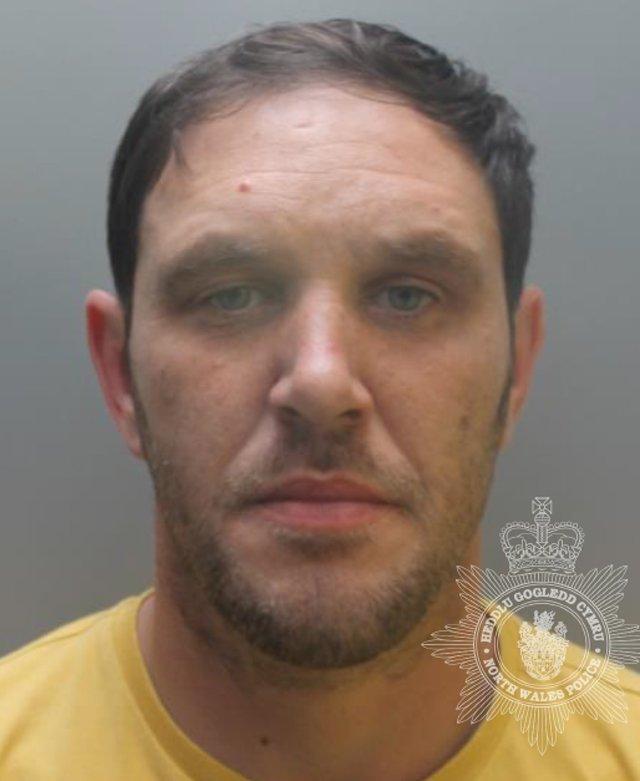
The family want to know now why Whall murdered Gerald Corrigan
But what was the motive?
Unusually in such a trial, the jury were not presented with a clear motive for Mr Corrigan's murder.
Peter Rouch QC, prosecuting barrister, told the jury: "Why he was shot, we may never know. It is never incumbent on the prosecution to prove why a crime has been committed, just that it has been and who was responsible for it."
For Marie Bailey and her children, they speak of their heartbreak at losing him.
But Marie still wants answers, saying: "To that sad, twisted, broken soul who murdered him I say if you have an ounce of humanity, any sense of decency, then you would tell us now why you have done this.
"Anyone who knows anything about why this man would have carried out such a despicable act, then I would implore you to come forward."
Are there unanswered questions?
One prominent character in the trial - even though he was not present in court - was Richard Wyn Lewis.
He was not a defendant or a witness, but his name cropped up almost on a daily basis in evidence.
In court, Ms Bailey claimed he had been responsible for obtaining £250,000 from the couple "through fraud" and alleged Mr Lewis had been growing cannabis on the couple's land.
The jury was told Whall and Mr Lewis had an argument "over money" six weeks after the shooting.
It also heard that, towards the end of May 2019, Whall had parked outside Mr Lewis's home for three nights in succession.
There was a suggestion that he may have been planning to kill or injure Mr Lewis by garrotting him with piano wire.
Mr Wyn Lewis was arrested on suspicion of conspiracy to murder and fraud but was later released and has not been charged with any offence. A file is with the Crown Prosecution Service.
BBC Wales spoke to Mr Lewis at his Anglesey farm. He said he had been friends with Gerald Corrigan for years and news of the shooting had come as a complete shock to him.
He denied having any part whatsoever in the murder.
- Published24 February 2020
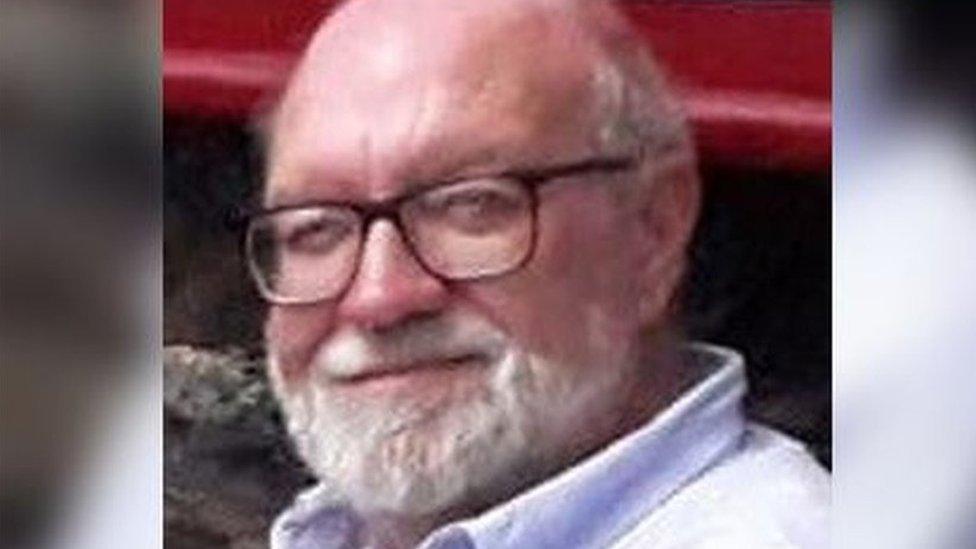
- Published3 February 2020

- Published23 January 2020

- Published27 January 2020
